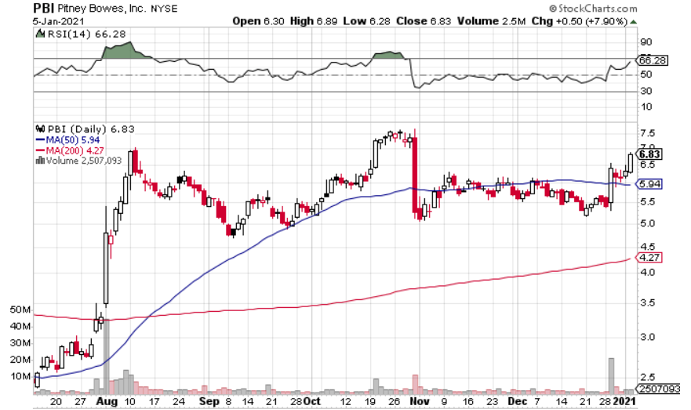On December 29,
Pitney Bowes NYSE: PBI announced that it is reinstating its 2020 holiday season pricing – effective January 25, 2021. The company cited labor and transportation costs,
COVID-related costs, and an expectation that
record delivery volumes would “continue well into 2021 and beyond” in its press release.
Investors cheered the news, and shares jumped more than 18% to $6.41 a pop. After essentially going sideways for the next three sessions, PBI jumped nearly 8% yesterday.
From a technical standpoint, shares look like they are primed to move higher.

But Consider the Long-Term Context
Pitney Bowes has historically sold postal meters and helped customers with physical mail, which, to put it gently, is not a booming industry in modern times. Management has pivoted to e-commerce – revenue in the e-commerce business grew 47% yoy to $410 million in Q3 – but the company’s historical business is in an irreversible decline.
Since peaking in the 1990s, PBI shares have lost more than 90% of their value. Over the last five years, shares have lost roughly two-thirds of their value.
All that said, the investor reaction to the company’s Q3 earnings was surprising:
You may have noticed a big drop on the chart in late October. Well, that drop came on the heels of the Q3 earnings report – shares plummeted 28.5% in that one session.
The numbers were solid. Revenue grew 13% yoy for the quarter, the fastest growth rate in over a decade. Earnings were 7 cents per share, topping analyst estimates of 5 cents per share and a 2 cents per share loss in the same-period a year ago.
What may have spooked investors was the announcement that the company’s CFO had accepted a role with Colgate-PalmoliveNYSE: CL. You certainly don’t want to see a C-Suite executive depart at such a critical time for a company. And PBI’s CEO lamented the loss on the earnings call. Repeatedly.
But a 28.5% decline because the CFO is leaving? Heck, it’s hard to imagine Amazon NASDAQ: AMZN stock going down anywhere close to that amount if the legendary Jeff Bezos suddenly stepped away.
Profit-taking may have been partially responsible for the dip.
Over the three-and-a-half months leading into the Q3 earnings report, PBI shares had more than tripled. Profit-taking would never drive a move of this magnitude for a large-cap, but PBI has a market cap of around $1 billion, so it’s more of a possibility.
Two months later, PBI shares are still trading lower than they were before the earnings release – even accounting for the surge that has happened over the past five sessions.
Is the Risk-Reward Attractive?
Let’s start with the good: PBI is trading at 17.4x projected 2021 earnings and 9.6x projected 2022 earnings. The e-commerce business won’t grow at 47% moving forward – 2020 was a great year for e-commerce and Pitney Bowes is growing it from a small base – but it could certainly grow at a double-digit CAGR over the next three years.
The bad: It is important to reiterate that PBI’s historical business is in an irreversible decline. Company-wide earnings are expected to increase considerably over the next couple of years, but revenue growth is expected to grow at a much slower rate. Revenue could start to decrease as we move towards the mid-2020s.
But debt is Pitney Bowes’ biggest problem:
Pitney Bowes has $2.6 billion of long-term debt. Though the company has $1.74 billion of cash, short-term investments, and finance receivables, that is still an implied net debt position of $860 million. To put that number into context, Pitney Bowes’ EBITDA was $75 million over the last 12 months. Its market cap is $1.18 billion.
How Should You Play PBI?
It’s easy to talk yourself into a Pitney Bowes investment. If the company’s 2022 earnings projection comes to fruition, you’d have a company that is trading at less than 10x earnings. That’s almost impossible to find in our current market environment, where deep-valueis scarce.
But Pitney Bowes’ debt is going to hang over the company for many, many years to come. There is a number where the risk-reward is attractive, but nearly $7 a share looks too high for PBI. Consider staying on the sidelines for now, but keep an eye on this company. A disappointing quarter or two could put PBI into buying range.
Before you consider Pitney Bowes, you'll want to hear this.
MarketBeat keeps track of Wall Street's top-rated and best performing research analysts and the stocks they recommend to their clients on a daily basis. MarketBeat has identified the five stocks that top analysts are quietly whispering to their clients to buy now before the broader market catches on... and Pitney Bowes wasn't on the list.
While Pitney Bowes currently has a Hold rating among analysts, top-rated analysts believe these five stocks are better buys.
View The Five Stocks Here
Discover the top 7 AI stocks to invest in right now. This exclusive report highlights the companies leading the AI revolution and shaping the future of technology in 2025.
Get This Free Report